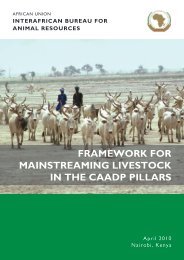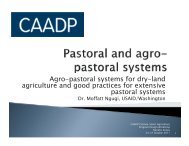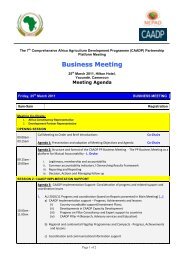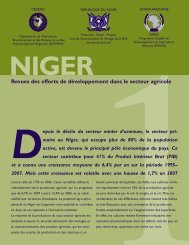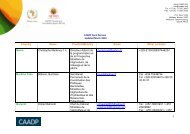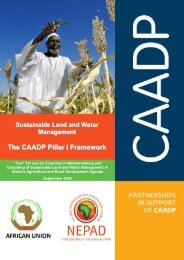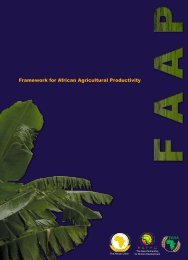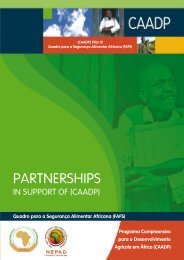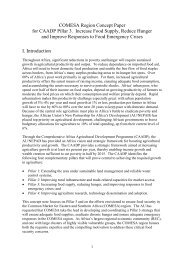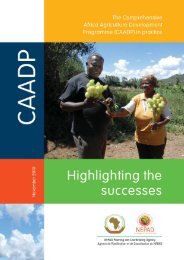The Role of Sustainable Land Management for Climate ... - CAADP
The Role of Sustainable Land Management for Climate ... - CAADP
The Role of Sustainable Land Management for Climate ... - CAADP
Create successful ePaper yourself
Turn your PDF publications into a flip-book with our unique Google optimized e-Paper software.
!<br />
allowances and <strong>of</strong>fsets are within the range <strong>of</strong> prices currently observed <strong>for</strong> CERs under the<br />
CDM. It may be that transactions costs and uncertainties affecting the CDM market will<br />
continue to keep prices <strong>for</strong> CERs low in the future and hence limit farmers’ incentives to<br />
participate, although prices are likely to be higher with <strong>of</strong>ficial U.S. participation in the carbon<br />
market than without it (as long as <strong>of</strong>fsets from other countries are allowed). Furthermore, U.S.<br />
cap and trade legislation may restrict the prices allowable <strong>for</strong> emission <strong>of</strong>fsets to no more than a<br />
maximum amount (e.g., $20 per tCO 2 e). With limited increase in carbon market prices, and<br />
given the very small number <strong>of</strong> projects related to SLM in SSA under the current CDM, even a<br />
substantial expansion <strong>of</strong> the CDM market may have small impacts on such activities in SSA,<br />
unless other changes to the CDM are enacted in the post-Kyoto treaty.<br />
Beyond the impacts on the volume and prices <strong>of</strong> trades in the global carbon market, U.S.<br />
leadership in climate change mitigation and adaptation activities could mean substantially greater<br />
commitments <strong>of</strong> U.S. <strong>for</strong>eign assistance to support such activities in SSA and other developing<br />
regions. This might prove to have larger impacts on support <strong>for</strong> SLM activities related to climate<br />
change in SSA in the near to medium term than the global market impact <strong>of</strong> U.S. ratification <strong>of</strong> a<br />
post-Kyoto treaty.<br />
Reducing emissions from de<strong>for</strong>estation and <strong>for</strong>est degradation<br />
<strong>The</strong> 2007 Bali Action Plan, which was adopted at 13 th session <strong>of</strong> the Conference <strong>of</strong> Parties<br />
(COP) <strong>of</strong> the UNFCCC in Bali, Indonesia, established a process <strong>for</strong> developing the post-Kyoto<br />
treaty and specifically proposed consideration <strong>of</strong> payments <strong>for</strong> reducing emissions from<br />
de<strong>for</strong>estation and <strong>for</strong>est degradation (REDD). 11 <strong>The</strong> potential magnitude <strong>of</strong> such payments is<br />
very large. According to one estimate, global REDD markets could be as large as $46 billion,<br />
assuming a carbon price <strong>of</strong> $30 per tCO 2 and that annual de<strong>for</strong>estation rates are reduced by 50%<br />
(Figure 4-1). With more conservative (and probably more realistic) assumptions about<br />
reductions in de<strong>for</strong>estation rates and carbon prices the size <strong>of</strong> this market would be smaller, but<br />
still could be very substantial. For example, with a carbon price <strong>of</strong> $10 per tCO 2 and assuming a<br />
!!!!!!!!!!!!!!!!!!!!!!!!!!!!!!!!!!!!!!!!!!!!!!!!!!!!!!!!!!!!!<br />
$$ !Among other actions to mitigate GHG emissions, the Bali Action Plan urged consideration <strong>of</strong> “Policy approaches<br />
and positive incentives on issues relating to reducing emissions from de<strong>for</strong>estation and <strong>for</strong>est degradation in<br />
developing countries; and the role <strong>of</strong> conservation, sustainable management <strong>of</strong> <strong>for</strong>ests and enhancement <strong>of</strong> <strong>for</strong>est<br />
carbon stocks in developing countries”. !<br />
!<br />
'+!



